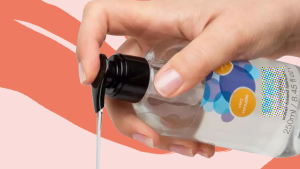Saliva is always accessible if you need it during sexual intercourse and may seem like a harmless swap; but sexual intercourse increases the risk of herpes infection, yeast infection, vagina irritation, and other Sexually Transmitted Infections, STIs.
A public health physician and sex educator, Dr. Yemi Adeyemi, said saliva is filled with viruses and bacteria, and when it reaches the genitals, it is bound to cause a nasty infection in the private part.
“If your partner has oral herpes and uses his or her saliva as lube, the virus can quite easily make its way down there, even if the partner has no symptoms of the disease.
“Saliva is more watery than slippery, which means it would dry quickly. This would increase the risk of wear and tear down there due to friction,” Dr Adeyemi said.
She advised that it is important to keep the safety of the vagina in mind when choosing a lubricant.
 Types of lubricants, pros and cons
Types of lubricants, pros and cons
She noted that the four types of artificial lubricants — natural-based, water-based, silicone-based, and oil-based — have their pros and cons.
Natural lubricants: They are natural, organic, or vegan lubricants made of botanicals or other eco-friendly ingredients.
Pros: It is free of paraben, a commonly used preservative with established health risks. Dr Adeyemi said natural lubricants use organic ingredients that are better for the environment and safe for the vagina.
Cons: Natural lubricants have shorter shelf lives, cost more, and are not readily available.
Water-based lubricants: They are the most common and come in two varieties — with glycerin, which has a slightly sweet taste; and without glycerin.
saliva is filled with viruses and bacteria, and when it reaches the genitals, it could cause nasty genital infection
Pros: They are cost-effective, easy to find, safe to use with condoms, less likely to cause vagina irritation (glycerin-free), they have longer shelf lives.
Cons: Lubricants with glycerin may cause a yeast infection. “Glycerin-free lubricants can taste bitter, it may not be the best option if you like to switch things up and between oral and penetrative sex,” the expert said.
Silicone-based lubricants: These lubricants are odourless, tasteless, slippery, and smooth.
Pros: They last the longest and do not need to be reapplied as often as water-based lubricants. They are safe to use with latex condoms and are hypoallergenic [relatively unlikely to cause an allergic reaction].
Cons: They are hard to wash off. You will need to give the area a soapy scrub to remove any residue. Adeyemi warned that they are not recommended for silicone sex toys because they can break them down, making them gummy and gross over time.
Oil-based lubricants: These are of two types — natural and synthetic.
“For the natural type, it has to do with coconut oil or butter; while the synthetic type has to do with mineral oil or vaseline,” she said.
Pros: Natural-based oil lubricants like avocado, coconut, vegetable, and olive oils are great for genital massages and all types of sexual play. They are also safe for the vagina and safe to eat.
Synthetic oil-based lubricants, on the other hand, including body lotions and creams, are good for external masturbation, but not internally.
Cons: Both natural and synthetic-based lubricants can destroy latex condoms, cause condom failure, and stain fabrics.
“Synthetic products are harder to clear out of your body than their natural counterparts, may irritate the vagina, and lead to vaginal infection,” Adeyemi warned.


